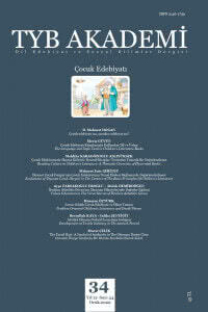Türkiye’nin Doğu Akdeniz’de Deniz Yetki Alanları Sorunlarına Yaklaşımı ve Türkiye-Libya Sınırlandırma Mutabakatı
Doğu Akdeniz’de 2000’li yılların başında yaşanmaya başlanan deniz alanlarına ilişkin sorunların esasını, kıyıdaş ülkelerin doğal kaynaklar üzerinde münhasır egemen yetkilere sahip oldukları kıta sahanlığı ve münhasır ekonomik bölge alanlarının (deniz yetki alanları), kıyıdaş ülkeler arasında paylaşılması (sınırlandırılması) oluşturmaktadır. Sorunun esası bu olmakla birlikte, bu temel sorundan kaynaklı daha birçok ilişkili sorunun daha yaşandığı görülmektedir. Sorunlar kendilerini, yapılan ikili sınırlandırma antlaşmalarının bütün taraflarca tanınmaması ve doğal kaynak bağlantılı faaliyetlere yapılan itirazlar biçiminde göstermektedir. Yakın zamanda Türkiye ile Libya arasında imzalanan ve iki taraf arasında deniz yetki alanlarını sınırlandıran Mutabakat, başta Yunanistan olmak üzere bazı ülkelerin hukuki itirazlarına konu olmuştur. Bu durum, Doğu Akdeniz’de bundan sonraki süreçlerde de bazı hukuki ve siyasi zorlukların yaşanmaya devam edeceği anlamına gelmektedir. Bununla birlikte Mutabakat’ın, bölgede deniz alanlarının sınırlandırılmasına ilişkin yeni bir hukuki ve siyasi aşama başlattığı ve Türkiye’nin hukuki yaklaşımları açısından, üzerinde analizler yapılması gereken önemli yansımalar oluşturduğu söylenebilir.
The Turkey’s Approach to the Maritime Delimitation Disputes in the Eastern Mediterranean Sea and the Maritime Delimitation Agreement between Turkey and Libya
The core of the disputes in the Eastern Mediterranean Sea that started to be experienced in the early 2000s is the delimitation of the continental shelf and exclusive economic zone, where riparian countries have exclusive sovereign rights over natural resources. Although the delimitation is the essence of the disputes, it has been clearly experienced that many more related problems arise. They demonstrate themselves mostly within the framework of the objections expressed towards the bilateral delimitation agreements and natural resource-related activities. The recently signed agreement between Turkey and Libya under the title of the Memorandum of Understanding to delimit the maritime jurisdictional areas between the two sides is subject to legal objections from certain countries including Greece. This means that some legal and political difficulties will continue to be experienced in the Eastern Mediterranean in the future. The Memorandum has, on the other hand, established a new legal and political stage as to the Turkey’s legal approach, which all need to be examined.
___
- Acer, Yücel. “Türkiye-Libya Deniz Siniri Antlaşmasi’nin Birleşmiş Milletler Tarafindan Tescilinin Önemi.” file:///D:/A.SETA/LİBYA-TÜRKİYE%20ANTLAŞMASI/Antlaşmanın%20Onaynın%20Önemi-SETA.pdf
- Charney, J.I. ‘Progress in International Maritime Boundary Delimitation Law’, American Journal of International Law, vol. 88, 1994, s. 245;
- Herman, L.L. ‘The Court Giveth and the Court Taketh Away: an Analysis of the Tunisia-Libya Continental Shelf Case’, International and Comparative Law Quarterly, vol. 33, 1984, s. 835.
- Shaw, M.N. Uluslararası Hukuk. 8. Basım (TÜBA), s. 416.
- The Letter of the Permanent Representative of Turkey to the UN: 2013/14136816/22273. 8 March 2013.
- Türkiye’nin 2004 Turkuno dt/4739 sayılı notası (2 Mart 2004).
- UN Security Council Resolution 2259.
- The Letter dated 15 June 2016 from the Chargé d’affaires a.i. of the Permanent Mission of Turkey to the United Nations addressed to the Secretary-General. A/70/945–S/2016/541.
- Letter dated 13 November 2019 from the Permanent Representative of Turkey to the United Nations addressed to the Secretary-General. A/74/550.
- Letter dated 9 December 2019 from the Permanent Representative of Greece to the United Nations addressed to the Secretary-General.
- Note Verbale dated 23 December 2019 from the Permanent Mission of Egypt to the United Nations addressed to the Secretary-General. A/74/628. Website of the Division for Ocean Affairs and the Law of the Sea.
- The Letter dated 14 February 2020 from the Permanent Representative of Greece to the United Nations addressed to the Secretary-General. Annex to this letter is the Letter dated 9 December 2019 from the Permanent Representative of Greece to the United Nations addressed to the Secretary-General. A/74/706. 19 February 2020. Website of the Division for Ocean Affairs and the Law of the Sea.
- Letter dated 29 April 2020 from the Permanent Representative of the Syrian Arab Republic to the United Nations addressed to the Secretary-General. A/74/831.
- Letter dated 2 July 2020 from the Permanent Representative of Turkey to the United Nations addressed to the Secretary-General. A/74/936.
- Note Verbale dated 14 August 2020 from the Permanent Mission of Turkey to the United Nations addressed to the Secretary-General. A/74/990.
- The letter dated 21 August 2020 from the Permanent Representative of Turkey to the United Nations addressed to the Secretary-General. A/74/997–S/2020/826.
- ISSN: 2146-1759
- Yayın Aralığı: Yılda 3 Sayı
- Başlangıç: 2011
- Yayıncı: Mustafa Ekici
Sayıdaki Diğer Makaleler
Hz. Muhammed’in Siyâsî Tecrübesinden Hareketle İslâm Devleti Kavramı
Doğu Akdeniz’de Enerji Eksenli İttifak Girişimleri ve Türkiye
Kıbrıs Vakıflarının Hukukî Statüsü ve Kapalı Maraş Açılımı
Tarihsel Perspektif İçinde Levant Havzası: Doğu Akdeniz ve Kıbrıs
Şeref GÖKÜŞ, Mehmet ŞAHİN, Zahide YILMAZ
Doğu Akdeniz’deki Enerji Rekabeti Üzerine Bir Değerlendirme
Doğu Akdeniz’de Paylaşım Rekabeti: Türkiye-Yunanistan Gerginliği ve Avrupa Birliği’nin Tutumu
